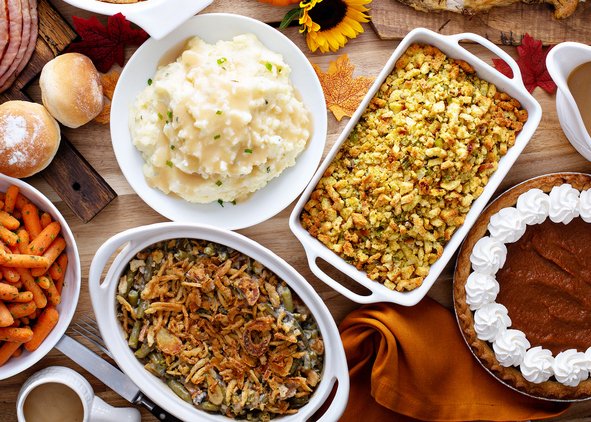
By Casey Bonano RD, LD
The holiday season kicks off with Halloween and continues its fast pace until the New Year. During this time, a barrage of media, marketing, and cultural messages related to the festivities fill our lives. On one hand, we are encouraged to indulge in candy and desserts, while simultaneously being urged to commit to changing our habits and striving for the ideal version of ourselves. This creates a confusing emotional experience. The holidays present challenges for many, especially those struggling with disordered eating or eating disorders. Remember, this holiday season, you have the power to choose. You can enjoy a balanced diet, savor your favorite treats, and not let your emotions dictate your eating behaviors.
FACTORS THAT INFLUENCE THE HOLIDAY DINNER TABLE
Numerous factors beyond just food can affect the celebration. The primary influences on individual eating habits during the holidays include:
• Family dynamics
• Meal or food traditions
• Past holiday experiences
• Stress from work or school
• Lack of structure
• Alcohol consumption
• Favorite food items
• Others’ eating habits
Does your holiday dining experience feel uncomfortable or overwhelmingly lively? Are attendees grazing on their plates or overindulging to the point of discomfort? Are you feeling stressed from work or unsure how to utilize your free time? Regardless, these influences can significantly affect your eating patterns.
HOW TO SURVIVE THE HOLIDAY DINNER TABLE
-
Plan ahead for the event. It’s generally easier to stick to a plan. Consider who will be attending, what food will be served, and the overall atmosphere. Identify specific challenges you may face.
-
Eat three regular meals on the day of the event. Skipping meals can lead to overeating when you finally eat, as hunger can override moderation. Prolonged periods without food can slow your metabolism. Remember, you cannot “save” calories; not eating just means you’re not burning as many.
-
Reach out to a supportive person before the gathering. Share your concerns with someone you trust who can assist you when challenges arise. If no one is aware of your struggles, they can’t provide help. If needed, discuss any issues with family or friends beforehand. If a family member often comments on food or body image, address the matter before the meal and kindly inform them you prefer not to discuss your eating choices or appearance.
-
Serve yourself balanced portions. Ensure you include your favorite dishes while leaving behind items you can do without. Avoid overloading your plate initially; you can always go back for more if needed.
-
Honor your feelings of fullness. Just because someone else is finishing every last bit of stuffing doesn’t mean you need to mimic that behavior. Pay attention to your body’s signals. If you’re full but still desire more, ask the host if you can take some home.
-
Practice mindfulness. Holiday meals often feature special foods that you may not have the opportunity to enjoy regularly, so take the time to appreciate each bite. Focus on the texture, aroma, and flavors.
-
Eat slowly. Aim to take at least 20 minutes for your meal, allowing your stomach and brain to communicate fullness signals. Recall tip number two; being overly hungry can lead to overeating.
-
Ensure you enjoy enough food. It’s entirely natural to appreciate food; enjoyment is a fundamental aspect of being human. Try to refrain from fixating on calorie counts and instead listen to your body to know when to stop.
-
Remember, it’s not solely about the food. The holidays should center on spending time with loved ones. If family gatherings become stressful, take some time for yourself to unwind.
- Avoid compensating with extreme measures. Resist the urge to under-eat in subsequent meals, days, or even months. This leads to a cycle of restriction and indulgence that is difficult to break.
You don’t have to overindulge or gain weight this holiday season. No single food causes weight gain; consistently overeating any food can lead to weight increase. Typically, individuals who overindulge during the holidays gain about 2-3 pounds. Once normal eating resumes in January, weight usually returns to baseline. Do not let food overshadow the joy of the season.
Editor’s Note: Casey Bonano is a Registered & Licensed Dietitian. You can reach her at:
www.dallasnutritionalcounseling.com






